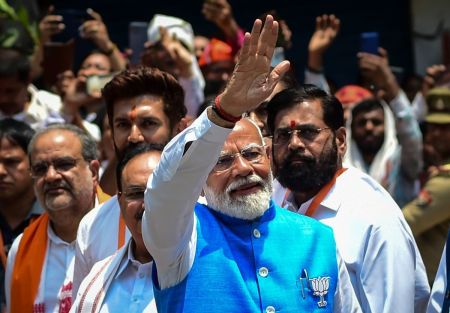Why Indian minorities are relieved after surprise election results

Narendra Modi might have won a third term as prime minister of India, but he also lost his majority in an election that was much tighter than most people expected. Now, he must decide how he will govern.
The prime minister would be wise to cast himself in the legacy of the late great Atal Bihari Vajpayee, the politician and poet who also served three terms as India’s prime minister.
As leader of the Bharatiya Janata Party (BJP), Vajpayee was a subscriber to Hindutva, but he worked intentionally to balance his religious beliefs with his commitment to India’s constitution as the world’s largest and most vibrant democracy.
In this election, the facts are clear: the prime minister and his colleagues campaigned for a supermajority of more than 370 seats (leading up to 400 seats along with their allies). Some of the BJP leaders had openly articulated that they needed this majority to literally change the constitution so that India’s laws would be dictated by the Hindu majority — to the exclusion of India’s hundreds of millions of minorities — including Christians.
Indians of all religions and parties rejected this vision, alarmed by a growing belief that aspects of India’s democracy were being eroded. With their votes, Indians made their commitment to democracy clear. There will be no march, for now, toward Hindu majoritarian rule and the rejuvenation of caste injustices.
Indians want their prime minister to be a head of state, not a religious figure, loosely appropriating the language of divine mandates.
Even though Modi has done a number of objectively good things in his decade-long rule — building India’s infrastructure, technology, business, global stature and many other praiseworthy achievements — he has not been able to shirk off the demands and beliefs of a majoritarian Hindu State. This must now change.
Certainly, to his and the BJP’s chagrin, it was the Hindus, especially the backward castes and Dalits, along with other minorities, who deprived him of even a simple majority of 272 seats in parliament.
In this election, the BJP reached only 240 seats — and lost in a number of its strongholds, including the temple town of Ayodhya, where the BJP fulfilled a political promise by building a new temple with an eye on the forthcoming elections.
In the 2019 general election, the BJP achieved 303 seats. The results this time round are a catastrophic blow to their policy agenda. There is no other way to interpret it. Instead of facing 107 members of the opposition, there will now be at least 232 seats in parliament that they do not control.
Indians who are committed to democracy — most of whom are Hindus — have breathed a sigh of great relief in light of this surprise result.
Yet, it is only a single achievement in what will require an enduring commitment to preserve India’s democracy. This is important, because as we’ve already witnessed all over the world, democracy is under siege.
I congratulate the prime minister and I congratulate the opposition. Each deserves, and will receive, my daily prayers. Those prayers will include my own gratitude to God for reminding us that democracy remains the best form of government ever imagined by mankind.
Archbishop Joseph D’Souza is an internationally renowned human and civil rights activist. He is the founder of Dignity Freedom Network, an organization that advocates for and delivers humanitarian aid to the marginalized and outcastes of South Asia. He is archbishop of the Anglican Good Shepherd Church of India and serves as the President of the All India Christian Council.





















